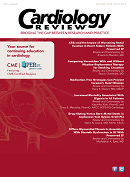Air Pollution Exposure May Be Modifiable CV Risk Factor
Air pollution should be viewed as one of several major modifiable risk factors in the prevention and management of cardiovascular disease.
Air Pollution Exposure May Be Modifiable CV Risk Factor
Air pollution should be viewed as one of several major modifiable risk factors in the prevention and management of cardiovascular disease (CVD), according to a position paper issued by the European Society of Cardiology (ESC) and published online December 9, 2014, in the European Heart Journal.
The paper looks into the mechanisms (ie, inflammation and atherosclerosis) and relationship between air pollution and CVD, and gives advice on how clinicians should counsel high-risk patients to minimize their exposure to air pollution. Indoor air pollution is considered to be part of the risk picture for air pollution.
The paper advises that people limit exposure to air pollution in its detailed Societal and Personal Advice section that includes avoiding walking and cycling in streets with high traffic intensity, particularly during rush hour, and limiting time spent outdoors during highly polluted periods, especially for infants, the elderly, and those with cardiorespiratory disorders. Exercising in gyms with air filtration systems is also advised, along with the use of ventilation systems with filtration devices for homes in areas where pollution is high.
-----------------------------------
Sugar May Be Bigger Hypertension Contributor Than Salt
Although no arguments exist that recommendations to reduce the consumption of processed foods are inappropriate and unadvisable, a new review argues that adding sugar to your diet, not salt, may be the bigger contributor to hypertension. Sugar added to processed foods probably matters more than dietary sodium for hypertension, and fructose in particular may uniquely increase cardiovascular risk by inciting metabolic dysfunction and increasing blood pressure variability, myocardial oxygen demand, heart rate, and inflammation, according to James J. DiNicolantonio, PharmD, of Saint Luke’s Mid America Heart Institute, Kansas City, Missouri, and Sean C. Lucan, MD, MPH, of Montefiore Medical Center, New York City. Their article appears in the BMJ journal Open Heart.
The authors say the historical focus on sodium as a cause of hypertension is debatable. They agree that processed foods are the major source of sodium, but note that processed foods are also high in added sugars, the consumption of which might be more strongly and directly associated with hypertension and cardiometabolic risk. In fact, the review argues that the benefits of recommendations to reduce the consumption of processed foods may have less to do with sodium, “minimally related to blood pressure and perhaps even inversely related to cardiovascular risk,” and more to do with highly refined carbohydrates.
Other evidence about the risks of added dietary sugar include the following:
- Higher sugar intake significantly increases systolic (6.9 mm/Hg) and diastolic blood pressure (5.6 mm/Hg) in trials of 8 weeks or more in duration. This effect increases to 7.6/6.1 mm/Hg when studies that received funding from the sugar industry are excluded.
- Ingesting one 24-ounce soft drink has been shown to cause an average maximum increase in blood pressure of 15/9 mm/Hg and heart rate of 9 beats per minute.
- Those who consume 25% or more calories from added sugar have an almost 3-fold increased risk of death due to cardiovascular disease.
“It is time for guideline committees to shift [their] focus away from salt and focus greater attention to the likely more-consequential food additive: sugar,” the article concludes. “A reduction in the intake of added sugars, particularly fructose, and specifically in the quantities and context of industrially manufactured consumables, would help to not only curb hypertension rates, but might also help address broader problems related to cardiometabolic disease.”
